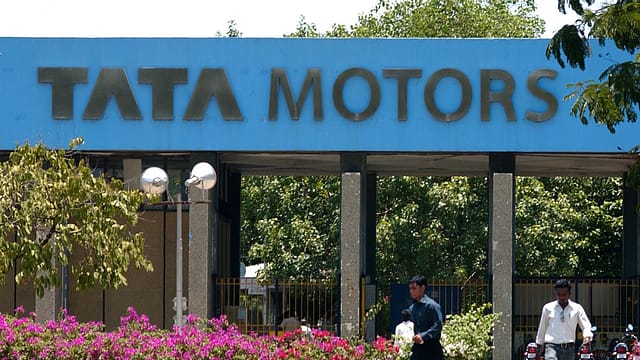Tata Motors stock hits all-time high
ADVERTISEMENT

Shares of Tata Motors rose as much as 3% to hit a new record high of ₹665.40 on Wednesday after the automaker reported a net profit of ₹3,203 crore for the quarter ended June. The company's board of directors approved a scheme for the cancellation of shares with differential voting rights and replacing them with ordinary shares.
Reacting to these developments, the Tata Motors stock opened at ₹640 before hitting an all-time high of ₹665.40 apiece on the National Stock Exchange (NSE). The company's market cap rose to ₹2.15 lakh crore.
Tata Motors currently has two types of listed equity securities, namely Ordinary Shares and 'A' Ordinary Shares. The 'A' Ordinary Shares carry 1/10th of the voting rights of Ordinary Shares and are entitled to five percentage points higher dividend. In order to simplify the capital structure, the company approved a scheme of arrangement for cancellation of 'A' Ordinary Shares, and the issue of 7 Ordinary Shares for every 10 'A' Ordinary Shares.
The 'A' Ordinary Shares were first issued by Tata Motors in 2008 and subsequently in a further qualified institutional placement (QIP) in 2010 and rights issue in 2015. Regulatory changes have since restricted the issuance of such instruments with differential voting rights and Tata Motors remains the only large listed corporate with such an instrument.
January 2026
Netflix, which has been in India for a decade, has successfully struck a balance between high-class premium content and pricing that attracts a range of customers. Find out how the U.S. streaming giant evolved in India, plus an exclusive interview with CEO Ted Sarandos. Also read about the Best Investments for 2026, and how rising growth and easing inflation will come in handy for finance minister Nirmala Sitharaman as she prepares Budget 2026.
The 'A' Ordinary Shares were trading at around 43% discount to Ordinary Shares as of July 24, 2023. "The Capital Reduction Consideration implies a 23% premium on the previous day's closing share price of 'A' Ordinary shares, translating to 30% discount over Ordinary Share price and significantly below its historical averages. The Scheme will lead to a reduction in the outstanding equity shares by 4.2%, making it value accretive for all shareholders," the carmaker says.
Tata Motors' consolidated revenue surged 42% year-on-year to ₹1.02 lakh crore, while EBITDA was at ₹14,700 crore (up 177% YoY) and EBIT margin came out to be 8.1%, up 880 bps, all showing a sharp improvement driven by JLR.
JLR's revenues improved by 57% to £6.9 billion on "strong wholesales and improved mix". Tata Motors' PV business remained steady, with 11.1% revenue growth and EBIT of 1% (+10bps) in Q1 FY24. "The Tata PV in Q1 FY24 saw robust demand, driven by new launches, especially in the SUV segment and EVs," says the company.
This comes days after the Tata group announced plans to invest over 4 billion pounds or ₹42,500 crore to set up a 40-gigawatt battery cell gigafactory in the United Kingdom. JLR and Tata Motors will be anchor customers and supplies will commence from 2026. The electric car battery factory will be one of the largest in Europe. The new gigafactory, which is expected to create up to 4,000 new direct jobs, is also one of the largest-ever investments in the UK automotive sector.
Tata Group also plans to set up a lithium-ion cell manufacturing unit in Gujarat with an initial investment of around ₹13,000 crore. Its subsidiary Agratas Energy signed a Memorandum of Understanding (MoU) with the Government of Gujarat to build a gigafactory with production capacity of 20-gigawatt hours.
